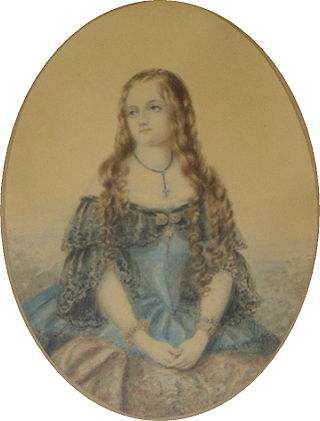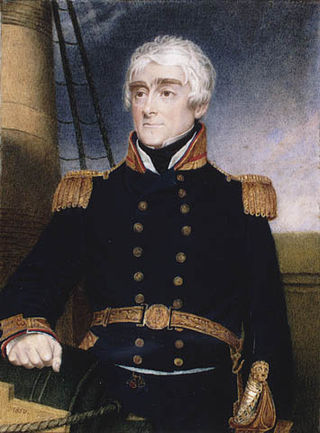
Duke of Westminster is a title in the Peerage of the United Kingdom. It was created by Queen Victoria in 1874 and bestowed upon Hugh Grosvenor, 3rd Marquess of Westminster. It is the most recent dukedom conferred on someone not related to the British royal family.

Viscount Cobham is a title in the Peerage of Great Britain that was created in 1718. Owing to its special remainder, the title has passed through several families. Since 1889, it has been held by members of the Lyttelton family.

Earl of Kingston is a title in the Peerage of Ireland. It was created in 1768 for Edward King, 1st Viscount Kingston. The Earl holds the subsidiary titles Baron Kingston, of Rockingham in the County of Roscommon, Viscount Kingston, of Kingsborough in the County of Sligo, Baron Erris, of Boyle in the County of Roscommon, and Viscount Lorton, of Boyle in the County of Roscommon, also in the Peerage of Ireland. He is also a baronet in the Baronetage of Ireland. Between 1821 and 1869 the earls also held the title Baron Kingston, of Mitchelstown in the County of Cork, in the Peerage of the United Kingdom.

Viscount Gage, of Castle Island in the County of Kerry of the Kingdom of Ireland, is a title in the Peerage of Ireland. It was created in 1720 for Thomas Gage, along with the subsidiary title of Baron Gage, of Castlebar in the County of Mayo, also in the Peerage of Ireland. In 1744 he also succeeded his cousin as eighth Baronet, of Firle Place. The titles remain united. The Gage family descends from John Gage, who was created a baronet, of Firle Place in the County of Sussex, in the Baronetage of England on 26 March 1622. His great-grandson, the seventh Baronet, represented Seaford in Parliament. He was succeeded by his first cousin, Thomas Gage, 1st Viscount Gage, the eighth Baronet. He sat as a Member of Parliament for Minehead and Tewkesbury and also served as Governor of Barbados. In 1720, 24 years before succeeding in the baronetcy, he was raised to the Peerage of Ireland as Baron Gage and Viscount Gage. His second son was the military commander the Hon. Thomas Gage.

Baron Hesketh, of Hesketh in the County Palatine of Lancaster, is a title in the Peerage of the United Kingdom. It was created in 1935 for Sir Thomas Fermor-Hesketh, 8th Baronet, who had previously briefly represented Enfield in the House of Commons as a Conservative. As of 2010 the titles are held by his grandson, the third Baron, who succeeded his father in 1955. Lord Hesketh held junior ministerial positions in the Conservative administrations of Margaret Thatcher and John Major. However, he lost his seat in the House of Lords after the House of Lords Act 1999 removed the automatic right of hereditary peers to sit in the upper chamber of Parliament.
This is a list of people who served as Lord Lieutenant of Haverfordwest. The county corporate of Haverfordwest was usually under the jurisdiction of the Lord Lieutenant of Pembrokeshire, but it had its own Lord Lieutenant and Custos Rotulorum from 1761 until 1931.

Barbarina Brand, Lady Dacre, was an English poet, playwright, and translator. In addition to her writing, she sculpted, rode, was proficient in both French and Italian, and maintained an extensive correspondence with a circle of other literary women, including Joanna Baillie, Mary Russell Mitford, and Catherine Maria Fanshawe.

The Ogle baronetcy, of Worthy, was a title in the Baronetage of the United Kingdom. It was created on 12 March 1816 for Admiral Chaloner Ogle, of Kings Worthy, Hampshire.

General Sir Charles Asgill, 2nd Baronet, was a career soldier in the British Army. At the end of the American Revolutionary War he became the principal of the so-called Asgill Affair of 1782, in which his retaliatory death sentence while a prisoner of war was commuted by the American forces who held him, due to the direct intervention of the government of France. Later in his career, he was involved in the Flanders campaign, the suppression of the Irish Rebellion of 1798 and was Commander of the Eastern Division of Ireland during the Irish rebellion of 1803.
Asgill is a surname. Notable people with the surname include:

Sir Charles Asgill, 1st Baronet merchant banker, was the third son of Henry Asgill, silkman, of St Clement Danes, Middlesex and was educated at Westminster School.
Charles Asgill may refer to:

There have been three baronetcies created for members of the Blakiston family of Blakiston, County Durham, two in the Baronetage of England and one in the Baronetage of Great Britain. One creation is extant as of 2008.
There have been five baronetcies created for persons with the surname Reid, one in the Baronetage of Nova Scotia and four in the Baronetage of the United Kingdom. As of 2019 one creation is extant.
There have been four baronetcies created for persons with the surname Dundas, one in the Baronetage of Great Britain and three in the Baronetage of the United Kingdom. One creation is extant as of 2008.

Richmond Place, now known as Asgill House, is a Grade I listed 18th-century Palladian villa on Old Palace Lane in Richmond, London, overlooking the River Thames. The house is on the former site of the river frontage and later the brewhouse for the medieval and Tudor Richmond Palace. It is 8 miles (13 km) from Charing Cross and was built in 1757–58 by Sir Robert Taylor as a summer and weekend parkland villa beside the River Thames for Sir Charles Asgill, who was Lord Mayor of London in 1761–62. It has been described as a "among the last villas of importance to be erected on the banks of the Thames".

Admiral of the Fleet Sir Charles Ogle, 2nd Baronet was a Royal Navy officer. As a junior officer, he saw action leading storming parties at the capture of Martinique and at the capture of Guadeloupe during the French Revolutionary Wars. He also took part in the landings in Egypt in the later stages of the French Revolutionary Wars.
The High Sheriff of County Kilkenny was the British Crown's judicial representative in County Kilkenny, Ireland from the 16th century until 1922, when the office was abolished in the new Free State and replaced by the office of Kilkenny County Sheriff. The sheriff had judicial, electoral, ceremonial and administrative functions and executed High Court Writs. In 1908, an Order in Council made the Lord-Lieutenant the Sovereign's prime representative in a county and reduced the High Sheriff's precedence. However, the sheriff retained his responsibilities for the preservation of law and order in the county. The usual procedure for appointing the sheriff from 1660 onwards was that three persons were nominated at the beginning of each year from the county and the Lord Lieutenant then appointed his choice as High Sheriff for the remainder of the year. Often the other nominees were appointed as under-sheriffs. Sometimes a sheriff did not fulfil his entire term through death or other event and another sheriff was then appointed for the remainder of the year. The dates given hereunder are the dates of appointment. All addresses are in County Kilkenny unless stated otherwise.
Charles Coote may refer to:
Sir James Graham, 1st Baronet was a British Tory politician.











